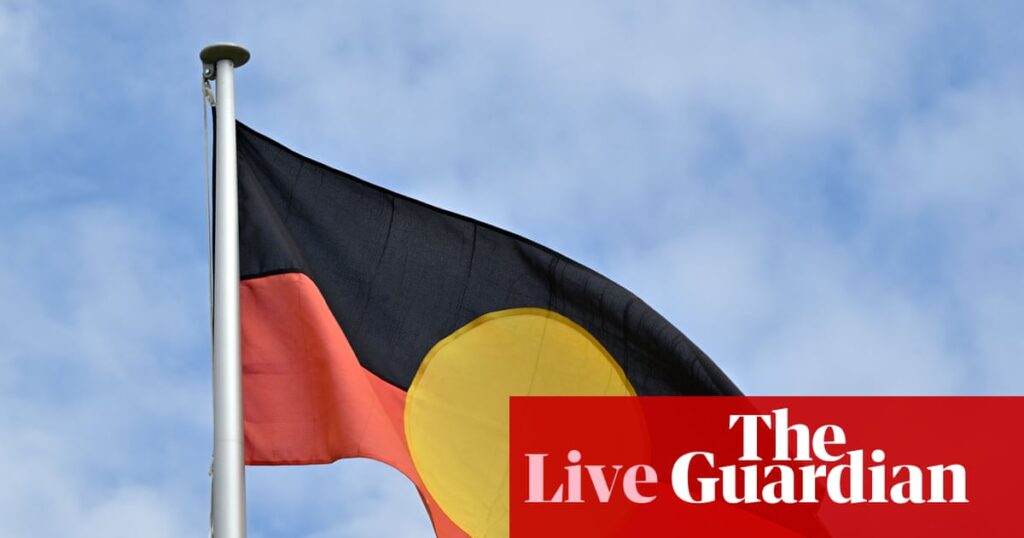Only four Closing the Gap targets on track to be met
Without changing the approach to Closing the Gap, Aboriginal and Torres Strait Islander people will continue to “pay the price”, Indigenous organisations say.
Just four of the 19 Closing the Gap targets are on track to be met, according to the latest data from the Productivity Commission, Australian Associated Press reports.
But key targets, including adult imprisonment rates, children in out-of-home care, suicide and childhood development, are continuing to worsen.
While there have been improvements in year 12 attainment, tertiary education and housing access, these are not on track to meet deadlines.
Key events
Moving onto the Today Show, Chalmers is facing more questions about the relationship between the US and Australia.
There are a few elements to it this morning – there’s the tariff situation, the delay in the AUKUS review (which the administration announced yesterday would be completed this spring, outside the original 30-day timeline), and the fact that the US hasn’t sent over a new ambassador to Australia.
It’s not super uncommon for the charges d’affaires (the second in charge in an embassy) to be the number one in charge for a while until an ambassador is selected.
Under the last Trump administration, Donald Trump took two years to appoint veteran Republican lawyer Arthur B Culvahouse Jr to the role – and it took another couple of months on top of that for the US Senate to approve him.
Chalmers says it’s “not unusual” for countries to take time to appoint an ambassador, and that “it hasn’t prevented us from working closely with the Americans”.
He rejects the assertion that there’s a lot of “uncertainty” in the relationship, and also says it’s “not unusual” for the new government to review the Aukus deal.
Well, I’m not sure about that. I think that might be overdoing it, but more broadly, there’s a lot of uncertainty in the global economy. We’re seeing that play out. Tariffs are part of that. National security considerations are part of that as well.
Natasha May
Anika Wells on social media ban: ‘We can’t police the ocean, but we can police the sharks’
The communications minister has explained the government is restricting children’s YouTube access instead of targeting social media companies’ responsibilities with an analogy that while it is impossible to police the ocean, they are “going to have a crack” at policing the sharks.
Anika Wells appeared on ABC’s 7.30 program yesterday evening after news this week that children will be banned from having YouTube accounts from December, with the federal government backflipping on an earlier decision to exempt the video platform from the national under-16s social media restrictions.
In response to being asked if the bigger question was not why social media companies are putting vile material on their platforms in the first place, Wells said:
It is a question for the social media platforms. YouTube uploads 500 hours of content every 60 seconds. If you could put all of that social media content in a library, it would be the world’s worst library. You wouldn’t allow your child to walk into it, but the internet is here. The internet is ubiquitous. I’ve got little kids. We are all trying our best. Parents are trying their best, but it is like trying to teach your kids to swim in an open ocean with rips and sharks rather than at the pool. We can’t police the ocean, but we can police the sharks. We’re going to have a crack at it.
Wells said the government remains committed to a plan that will also see legal responsibility put on social media companies to prevent harmful content on their platforms.
Treasurer says recognising a Palestinian state ‘a matter of when, not if’
On to international issues, Chalmers is asked whether Australia could recognise a Palestinian state by September for the UN meeting – as the UK said it will do, unless Israel takes “substantive steps” to end the conflict and commit to a peace process.
Chalmers says he won’t put a timeframe on it but it’s “a matter of when, not if” – echoing comments made by both the prime minister and other ministers yesterday.
There are a number of obstacles still in the way to recognition of a Palestinian state. For example, the treatment, the release of the hostages, making sure that there’s absolutely no role for Hamas. These are the sorts of things that the international community is working through. But that statement that came out yesterday that we signed as Australians via our foreign minister, Penny Wong, is a really important one.
Chalmers is also asked about the tariff situation and says the government hasn’t “heard any different from the 10% baseline that’s been levied on Australia”.
Donald Trump has said this week more countries could be levied at 15% to 20%. Chalmers won’t rule out Australia being hit with a higher rate.
I think it would be a brave person to assume that there won’t be, whether it’s with other countries or – there will always be more announcements about this. These tariff announcements are a moving feast. But our expectation is we get the baseline.
Jim Chalmers says Australia ‘needs to do much better’ on Closing the Gap
Jim Chalmers starts on ABC News Breakfast this morning. He’s pretty happy with the inflation numbers and says the first two rate cuts this year were “very, very welcome” relief, but he won’t predict if there’ll be another.
Asked about the latest Closing the Gap data, Chalmers says Australia “needs to do much better” and that some outcomes have gone backwards in “worrying ways”.
Minister Malarndirri McCarthy is working in her characteristically diligent way with all of the stakeholders, all of the communities, to try to turn these numbers around. There has been progress in 10 of the 15. There has been some worrying outcomes in the rest, but overall, we need to do more and we need to do better.
McCarthy and the prime minister will be visiting the Garma festival next week, held in remote north-east Arnhem Land.

Krishani Dhanji
Good morning,
Krishani Dhanji here with you for the final sitting day of the fortnight, thanks to Martin Farrer for getting us started!
Jim Chalmers is doing the media rounds this morning, off the back of what he called “outstanding” inflation data yesterday.
The government has said it wants its childcare bill to be passed through parliament this week, which leaves today for it to be voted through the Senate (it has the support of the Coalition and the Greens).
And as Martin brought you earlier, we’ll be following the reaction to the latest Closing the Gap data.
Stay with us, it’s going to be a big one!
Closing the Gap review finds community controlled organisations key to progress
The new data follows a recent review of the Closing the Gap agreement, commissioned by the Coalition of Peaks.
The review found Indigenous community controlled organisations are key to progress, and governments must listen to First Nations people and share decision-making power to create positive change.
Productivity commissioner Selwyn Button said the review shows the outcomes of the agreement are falling well short of what governments have committed to.
What the outcomes in the agreement reflect most of all is the limited progress of governments in collectively acting on the priority reforms: sharing decision-making and data with communities; strengthening the Aboriginal community controlled sector and changing the way governments operate.
Coalition of Peaks Lead Convenor Pat Turner said improvements in early education enrolments, employment and land and sea rights show what’s possible when government partner with Indigenous organisations “in the right way”.
But she said when governments fail to meet their commitments to work with community controlled organisations the gap widens.
What’s important for Australians to understand is that Aboriginal community controlled organisations are not fringe services.
We’re not asking for special treatment. We’re asking for a fair share. When we get that, we deliver.
These are the Closing the Gap socioeconomic outcomes in the latest report in detail:
-
89.2% of babies were born with a healthy birthweight (improvement, but not on track)
-
94.2% of children were enrolled in preschool (on track)
-
33.9% of children commencing school were developmentally on track (worsening)
-
2,304 out of every 100,000 adults were in prison (worsening)
-
26 out of every 10,000 young people were in detention (no change)
-
50 out of every 1,000 children were in out-of-home care (worsening)
-
31 out of every 100,000 people took their own life (worsening)
-
4.3 million sq km of land were subject to Indigenous rights or interests (on track)
-
113,517 sq km of sea were subject to Indigenous rights or interests (on track)
-
88% of people used the internet (no assessment)
Closing the Gap results ‘unacceptable’
“It’s not enough to hope the gap will close, governments must hold themselves to account for the commitments they’ve made under the national agreement,” Coalition of Peaks lead convener Pat Turner said of the latest Closing the Gap report.
“That requires smart investment, longer-term flexible funding and full implementation of the four priority reforms – shifting power, not just policy.
“Without real power shift, we’ll keep seeing the same patterns repeat, and our people will continue to pay the price.”
The Queensland Aboriginal and Islander Health Council chief executive, Paula Arnol, said the latest Closing the Gap report card was disappointing.
“It’s 2025 and Aboriginal and Torres Strait Islander people are still not experiencing the health outcomes that non-Indigenous Australians enjoy. This is unacceptable,” she said.
Only four Closing the Gap targets on track to be met
Without changing the approach to Closing the Gap, Aboriginal and Torres Strait Islander people will continue to “pay the price”, Indigenous organisations say.
Just four of the 19 Closing the Gap targets are on track to be met, according to the latest data from the Productivity Commission, Australian Associated Press reports.
But key targets, including adult imprisonment rates, children in out-of-home care, suicide and childhood development, are continuing to worsen.
While there have been improvements in year 12 attainment, tertiary education and housing access, these are not on track to meet deadlines.
Welcome
Good morning and welcome to our live politics blog. I’m Martin Farrer with the top overnight stories and then it will be Krishani Dhanji with the main action.
The latest Closing the Gap report has been released this morning and it shows that progress is being made on only four of the 19 targets. Indigenous groups and advocates say governments need to do more. More details coming up.
Anika Wells, the communications minister, appeared on 7.30 last night to explain the government’s decision to restrict children’s YouTube access. More details coming up on that as well.

